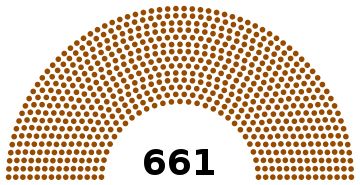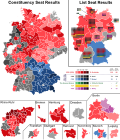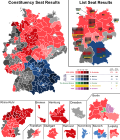Elections in Germany
| This article is part of a series on the |
| Politics of Germany |
|---|
 |
Several articles in several parts of the Basic Law for the Federal Republic of Germany govern elections and establish constitutional requirements such as the secret ballot, and the requirement that all elections be conducted in a free and fair manner. The Basic Law also requires that the federal legislature enact detailed federal laws to govern elections; electoral law(s). One such article is Article 38, regarding the election of deputies in the federal Bundestag. Article 38.2 of the Basic Law establishes universal suffrage: "Any person who has attained the age of eighteen shall be entitled to vote; any person who has attained the age of majority may be elected."
German federal elections are for all members of the Bundestag, which in turn determines who is the chancellor of Germany. The most recent federal election was held on 23 February 2025.
Result in history
1919 German federal election
November 1933 German parliamentary election
 | ||||
|---|---|---|---|---|
| Party | Votes | % | Seats | |
| Nazi Party | 39,655,224 | 92.11 | 661 | |
| Against | 3,398,249 | 7.89 | 0 | |
| Total | 43,053,473 | 100.00 | 661 | |
1949 West German federal election
1949 East German Constitutional Assembly election
Latest election
German elections from 1871 to 1945

After the
Following the
Imperial elections
Weimar Republic federal elections
Elections in Nazi Germany
- March 1933, federal
- November 1933, federal
German elections since 1949
Federal Republic of Germany
Election system

Federal elections (so called „Bundestagswahlen“) are conducted approximately every four years, resulting from the constitutional requirement for elections to be held 46 to 48 months after the assembly of the Bundestag.[4] Elections can be held earlier in exceptional constitutional circumstances: for example, were the Chancellor to lose a vote of confidence in the Bundestag, then, during a grace period before the Bundestag can vote in a replacement Chancellor, the Chancellor could request the Federal President to dissolve the Bundestag and hold elections. Should the Bundestag be dismissed before the four-year period has ended, elections must be held within 100 days. The exact date of the election is chosen by the President[5] and must be a Sunday or public holiday.
German nationals over the age of 18 who have resided in Germany for at least three months are eligible to vote. Eligibility for candidacy is essentially the same.
The federal
Germany has a
In 2008, some modifications to the electoral system were required under an order of the
The court allowed three years to amend the law. Accordingly, the 2009 federal election was allowed to proceed under the previous system. The changes were due by 30 June 2011, but appropriate legislation was not completed by that deadline. A new electoral law was enacted in late 2011, but declared unconstitutional once again by the Federal Constitutional Court upon lawsuits from the opposition parties and a group of some 4,000 private citizens.[7]
Finally, four of the five factions in the Bundestag agreed on an electoral reform whereby the number of seats in the Bundestag will be increased as much as necessary to ensure that any overhang seats are compensated through apportioned leveling seats, to ensure full proportionality according to the political party's share of party votes at the national level.[8] The Bundestag approved and enacted the new electoral reform in February 2013.[9]
List of federal election results


- 1st: 1949 West German federal election
- 2nd: 1953 West German federal election
- 3rd: 1957 West German federal election
- 4th: 1961 West German federal election
- 5th: 1965 West German federal election
- 6th: 1969 West German federal election
- 7th: 1972 West German federal election
- 8th: 1976 West German federal election
- 9th: 1980 West German federal election
- 10th: 1983 West German federal election
- 11th: 1987 West German federal election
- 12th: 1990 German federal election (1st of the re-united Germany)
- 13th: 1994 German federal election
- 14th: 1998 German federal election
- 15th: 2002 German federal election
- 16th: 2005 German federal election
- 17th: 2009 German federal election
- 18th: 2013 German federal election
- 19th: 2017 German federal election
- 20th: 2021 German federal election
- 21st: 2025 German federal election
-
1949
-
1953
-
1957
-
1961
-
1965
-
1969
-
1972
-
1976
-
1980
-
1983
-
1987
-
1990
-
1994
-
1998
-
2002
-
2005
-
2009
-
2013
-
2017
-
2021
European elections
Every 5 years, Germany, as a founding member of the European Union, votes to select their delegates to the European Parliament. Members of the European Parliament (MEPs) are elected through a proportional party list system, which, unlike federal elections, do not require a minimum threshold to win seats or constituency seats. The voting age is set at 16.[10]
- 1st: 1979 European Parliament election in West Germany
- 2nd: 1984 European Parliament election in West Germany
- 3rd: 1989 European Parliament election in West Germany
- 4th: 1994 European Parliament election in Germany
- 5th: 1999 European Parliament election in Germany
- 6th: 2004 European Parliament election in Germany
- 7th: 2009 European Parliament election in Germany
- 8th: 2014 European Parliament election in Germany
- 9th: 2019 European Parliament election in Germany
- 10th 2024 European Parliament election in Germany
-
2009
-
2014
-
2019
-
2024
Presidential elections
Germans do not directly vote for their President. Instead the President is elected every 5 years by the Federal Convention. All members of Bundestag and an equal number of state delegates elected by the state or 'Länder' parliaments specifically for this purpose, proportional to their population, comprise the voters of the convention.[11]
State elections in the Federal Republic of Germany
State elections are conducted under various rules set by the Länder (states). In general they are conducted according to some form of party-list proportional representation, either the same as the federal system or some simplified version. The election period is generally four to five years, and the dates of elections vary from state to state.
Baden-Württemberg state election results
- 2001 Baden-Württemberg state election
- 2006 Baden-Württemberg state election
- 2011 Baden-Württemberg state election
- 2016 Baden-Württemberg state election
- 2021 Baden-Württemberg state election
- 2026 Baden-Württemberg state election
Bavaria state election results
- 1986 Bavarian state election
- 1990 Bavarian state election
- 1994 Bavarian state election
- 1998 Bavarian state election
- 2003 Bavarian state election
- 2008 Bavarian state election
- 2013 Bavarian state election
- 2018 Bavarian state election
- 2023 Bavarian state election
- 2028 Bavarian state election
Berlin state election results
- 2001 Berlin state election
- 2006 Berlin state election
- 2011 Berlin state election
- 2016 Berlin state election
- 2021 Berlin state election
- 2023 Berlin repeat state election
- 2026 Berlin state election
Brandenburg state election results
- 1999 Brandenburg state election
- 2004 Brandenburg state election
- 2009 Brandenburg state election
- 2014 Brandenburg state election
- 2019 Brandenburg state election
- 2024 Brandenburg state election
Bremen state election results
- 2003 Bremen state election
- 2007 Bremen state election
- 2011 Bremen state election
- 2015 Bremen state election
- 2019 Bremen state election
- 2023 Bremen state election
Hamburg state election results
- 2004 Hamburg state election
- 2008 Hamburg state election
- 2011 Hamburg state election
- 2015 Hamburg state election
- 2020 Hamburg state election
- 2025 Hamburg state election
Hessian state election results
- 1999 Hessian state election
- 2003 Hessian state election
- 2008 Hessian state election
- 2009 Hessian state election
- 2013 Hessian state election
- 2018 Hessian state election
- 2023 Hessian state election
Lower Saxony state election results
Mecklenburg-Vorpommern state election results
- 2002 Mecklenburg-Vorpommern state election
- 2006 Mecklenburg-Vorpommern state election
- 2011 Mecklenburg-Vorpommern state election
- 2016 Mecklenburg-Vorpommern state election
- 2021 Mecklenburg-Vorpommern state election
- 2026 Mecklenburg-Vorpommern state election
North Rhine-Westphalia state election results
- 2000 North Rhine-Westphalia state election
- 2005 North Rhine-Westphalia state election
- 2010 North Rhine-Westphalia state election
- 2012 North Rhine-Westphalia state election
- 2017 North Rhine-Westphalia state election
- 2022 North Rhine-Westphalia state election
- 2027 North Rhine-Westphalia state election
Rhineland-Palatinate state election results
- 2001 Rhineland-Palatinate state election
- 2006 Rhineland-Palatinate state election
- 2011 Rhineland-Palatinate state election
- 2016 Rhineland-Palatinate state election
- 2021 Rhineland-Palatinate state election
- 2026 Rhineland-Palatinate state election
Saarland state election results
- 1999 Saarland state election
- 2004 Saarland state election
- 2009 Saarland state election
- 2012 Saarland state election
- 2017 Saarland state election
- 2022 Saarland state election
- 2027 Saarland state election
Saxony state election results
- 1999 Saxony state election
- 2004 Saxony state election
- 2009 Saxony state election
- 2014 Saxony state election
- 2019 Saxony state election
- 2024 Saxony state election
Saxony-Anhalt state election results
- 2002 Saxony-Anhalt state election
- 2006 Saxony-Anhalt state election
- 2011 Saxony-Anhalt state election
- 2016 Saxony-Anhalt state election
- 2021 Saxony-Anhalt state election
- 2026 Saxony-Anhalt state election
Schleswig-Holstein state election results
- 2000 Schleswig-Holstein state election
- 2005 Schleswig-Holstein state election
- 2009 Schleswig-Holstein state election
- 2012 Schleswig-Holstein state election
- 2017 Schleswig-Holstein state election
- 2022 Schleswig-Holstein state election
- 2027 Schleswig-Holstein state election
Thuringia state election results
German Democratic Republic
In the
Prior to the
Local elections
Local elections in Germany (German: Kommunalwahlen) include elections for most regional and local subdivisions, unless their representatives are appointed or elected by another assembly or office. Such local elections are conducted for representatives in districts, cities, towns, villages and various other administrative regional organizations. In cities and towns local elections usually include voting for a lord mayor or mayor. Smaller villages and settlements may elect a representative (German: Ortsvorsteher) with limited administrative power. Local elections are also often combined with polls about important local matters and questions of general public interest (i.e. the construction of local roads or other infrastructure facilities). While such polls are not legally binding in most cases, their results have considerable influence on local political decisions.[citation needed]
After the
See also
- Electoral calendar
- Electoral system
- Electoral system of Germany
- Referendums in Germany
References
- ^ Peter Marschalck: Bevölkerungsgeschichte Deutschlands im 19. und 20. Jahrhundert, Frankfurt am Main 1984, S. 173.
- ^ Evans, Richard J., The Coming of the Third Reich, Penguin Press, New York, 2004.
- ^ von Götz, Irene. "Violence Unleashed". Berlin.de. Archived from the original on 18 August 2016. Retrieved 18 March 2017.
- ^ "Art. 39 Grundgesetz". Grundgesetz Bundesrepublik Deutschland. Bundesministerium der Justiz. 19 March 2009. Retrieved 5 June 2009.
- ^ "§16 Bundeswahlgesetz". Bundeswahlgesetz Bundesrepublik Deutschland. Bundesministerium der Justiz. 3 June 2008. Retrieved 5 June 2009.
- ^ "Federal Constitutional Court decision on the Federal Election Law". Bverfg.de. 3 July 2008. Retrieved 20 September 2013.
- ^ Decision of the Federal Constitutional Court. 25 July 2012. Retrieved 13 August 2012.
- ^ Bill amending the Federal Election Law. 11 December 2012. Retrieved 25 December 2012.
- ISSN 0044-2070. Retrieved 26 January 2017.
- ^ "Elections to the European Parliament". Federal Ministry of the Interior and Community. Archived from the original on 22 January 2025. Retrieved 27 January 2025.
- ^ "Election of the Federal President". Der Bundespräsident. Archived from the original on 15 December 2023. Retrieved 27 January 2025.
- ISBN 9783593394893
- ISBN 9783486523638.
Further reading
- Kitschelt, Herbert (October 2003). "Political-economic context and partisan strategies in the German federal elections, 1990–2002". S2CID 154479425.
- Manow, Philip (January 2007). "Electoral rules and legislative turnover: Evidence from Germany's mixed electoral system". S2CID 59398190.
External links
- Adam Carr's Election Archive
- Parties and elections
- Opinion poll tracker with data, graph and daily average
- Latest polling results for state and federal elections (in German)
- The Federal Returning Officer. Official Site of the Federal Returning Officer.
- Collection of German Election Posters of Weimar Republic and Federal Republic
- NSD: European Election Database – Germany Archived 5 October 2017 at the Wayback Machine publishes regional level election data; allows for comparisons of election results, 1990–2009




























